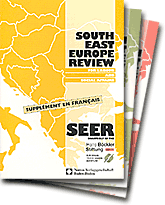Bulgaria’s New Identity
Bulgaria’s New Identity
Author(s): Nikolai GenovSubject(s): Politics / Political Sciences
Published by: Nomos Verlag
Summary/Abstract: The accession of Bulgaria to the European Union is a turning point in the way Bulgarians see and understand themselves. It is also a turning point in the way in which ‘the world’ sees and understands Bulgaria and its people. A new identity for Bulgarian society, nation and state is on the way due to the new place of the country in supranational structures and due to profound changes in the country itself. Some major building blocks of this new identity are actually well-known and internationally respected. Bulgaria has a very rich cultural tradition comprising historical layers and amalgamations of various civilisations. Bulgarian statehood is among the oldest in Europe and has a history with a long record of episodes marked by regional and continental relevance. This historical and cultural basis of Bulgarian identity is taken here for granted and will not be discussed in this article; under our consideration is simply the current history of Bulgarian society and the challenges which it has to face. Some of these challenges are essentially constructive. For instance, there is sufficient historical evidence showing that membership of the European Union raises tremendous problems for newcomers. However, it is also a powerful boost to technological modernisation and to economic growth in the new member states. The rapid acquisition and institutional implementation of a most elaborate supranational legal system is rather difficult, but it does open up the possibility for an accelerated upgrading of the efficiency of the public administration and of all other institutions. Intensive cultural exchange with centres of modern civilization undoubtedly puts pressure on national cultural traditions. Yet, simultaneously, it brings national cultural discourse and artistic life into contact with the highest level of internationally-recognised cultural achievement
Journal: SEER - South-East Europe Review for Labour and Social Affairs
- Issue Year: 2006
- Issue No: 03
- Page Range: 43-56
- Page Count: 14
- Language: English

